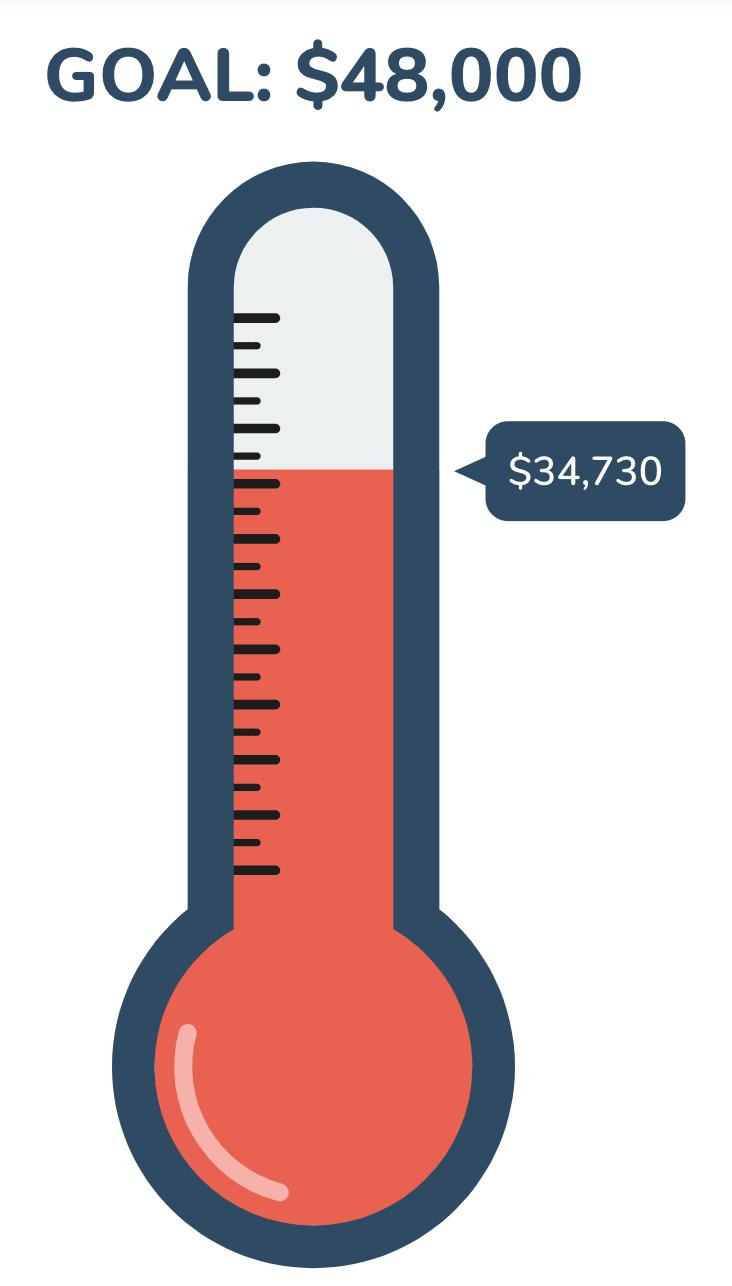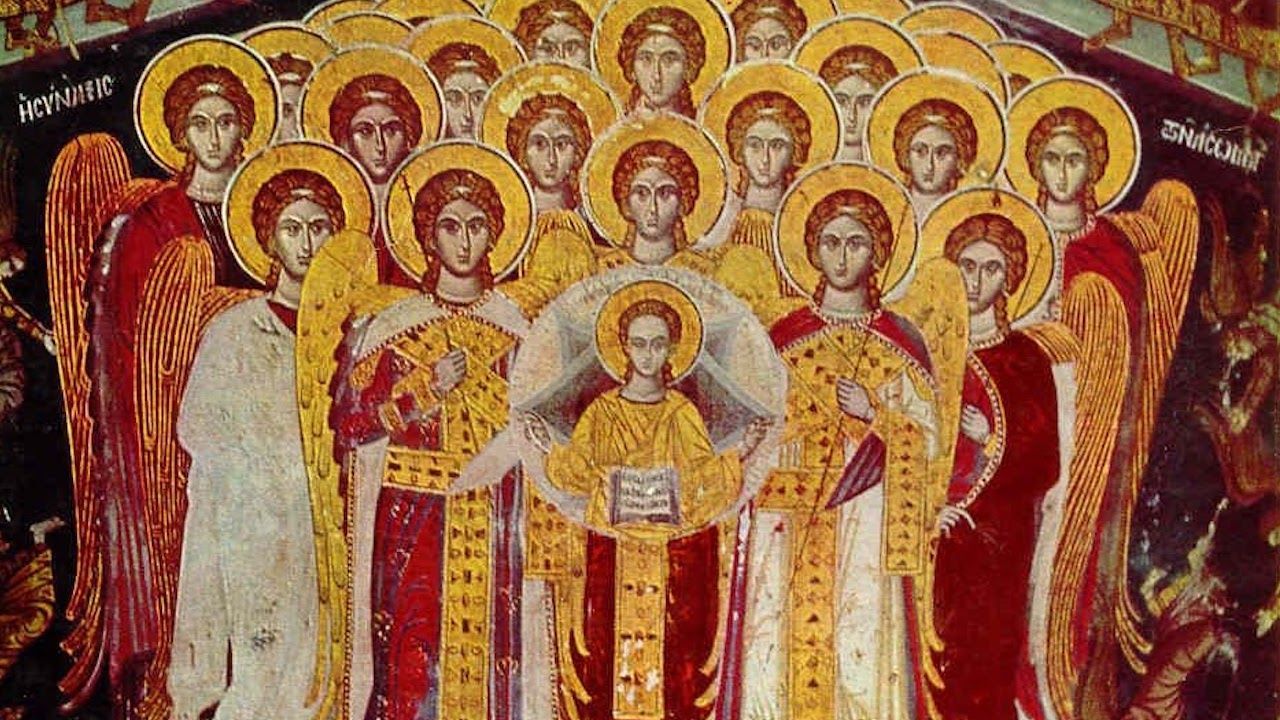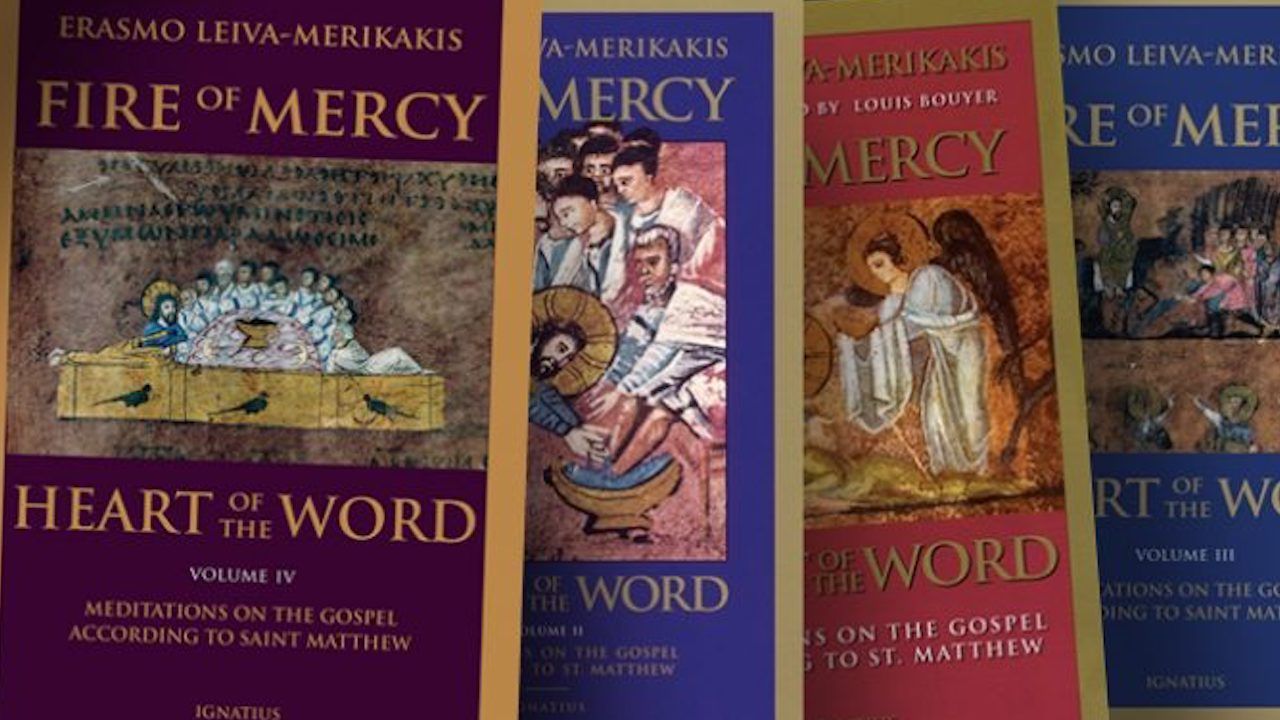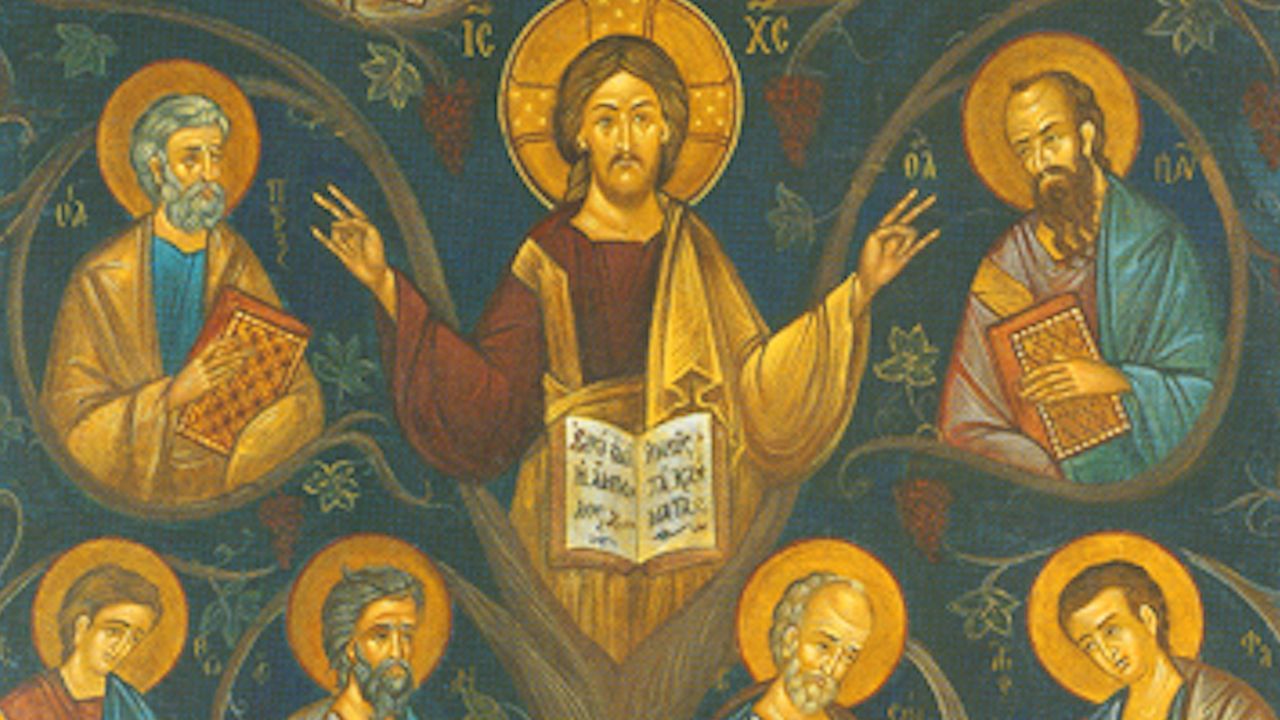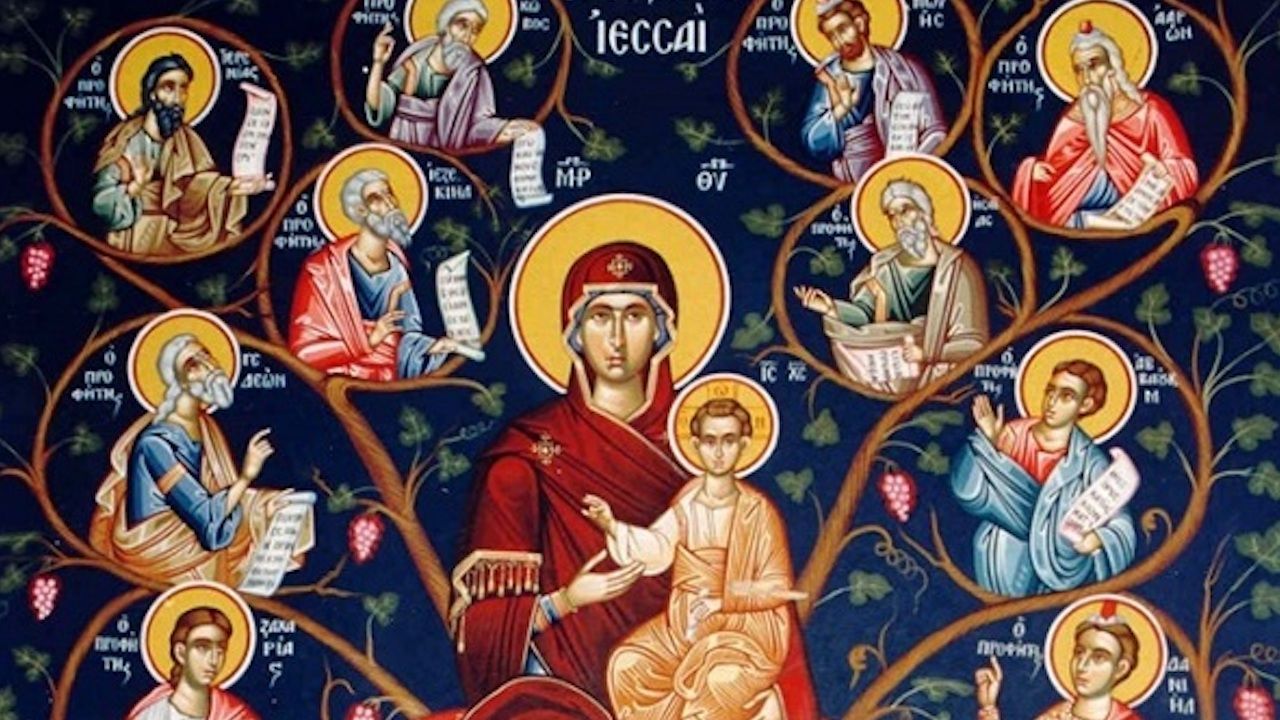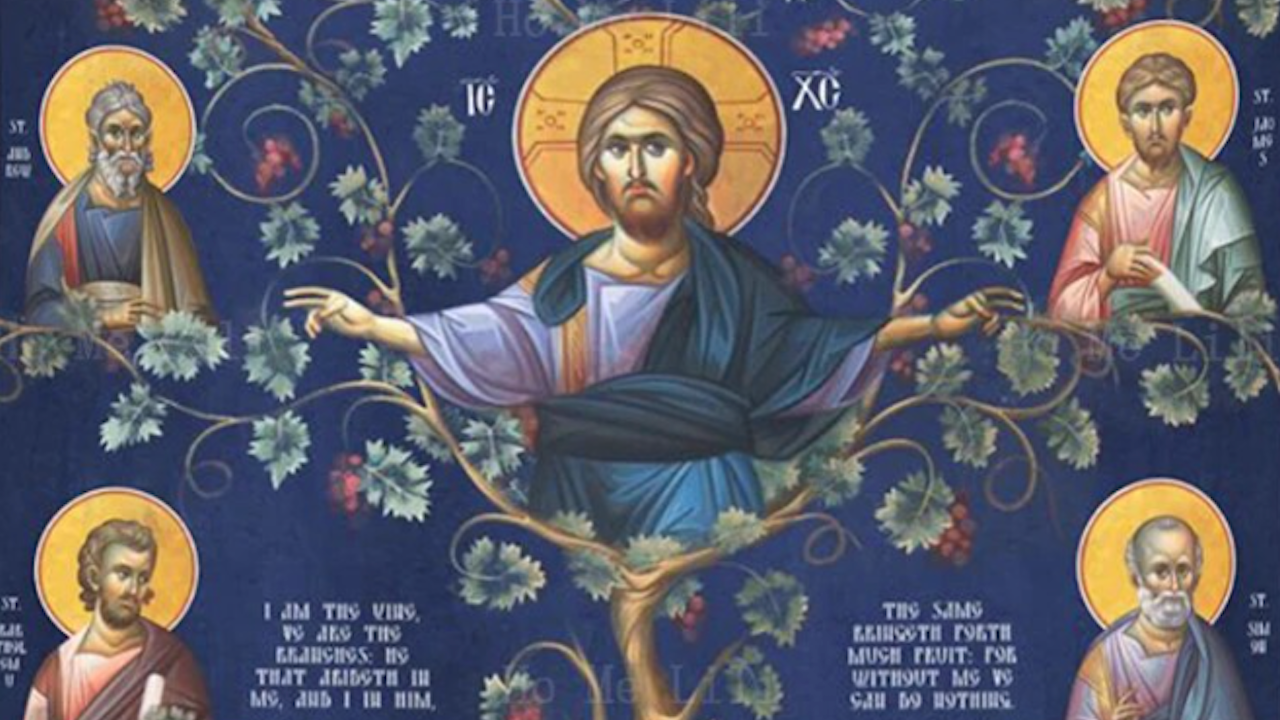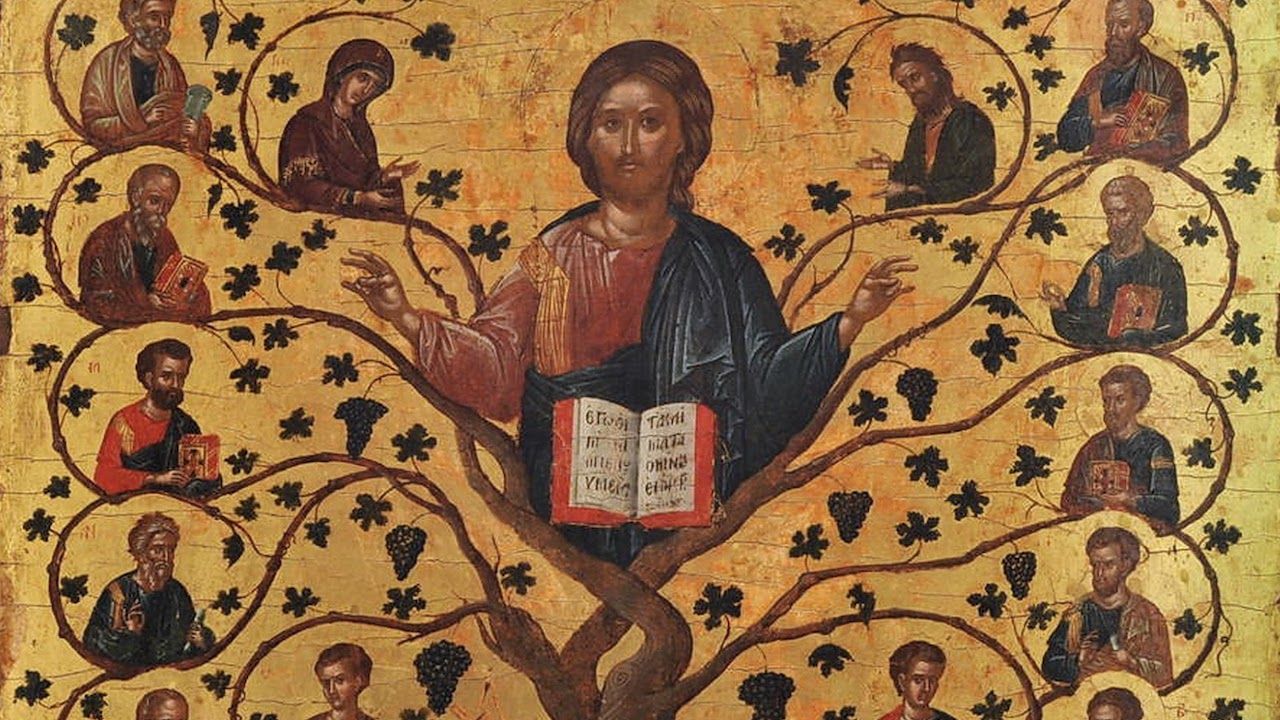Paganism, Renewal, Hope, and Order
by Erin Doom
Feast of St Gregory of Nyssa
Anno Domini 2021, January 10

1. Bible: John 1:29-34
At that time, John saw Jesus coming toward him, and said, “Behold, the Lamb of God, who takes away the sin of the world! This is He of whom I said, ‘After me comes a man who ranks before me, for he was before me.’ I myself did not know Him; but for this I came baptizing with water, that He might be revealed to Israel.” And John bore witness, “I saw the Spirit descend as a dove from heaven, and it remained on Him. I myself did not know Him; but He who sent me to baptize with water said to me, ‘He on whom you see the Spirit descend and remain, this is He who baptizes with the Holy Spirit.’ And I have seen and have borne witness that this is the Son of God.”
2. Liturgy: Theophany and Synaxis of the Holy and Glorious Prophet, Forerunner, & Baptist John
On January 6 the Church celebrates Theophany, the baptism of our Lord and Savior and the manifestation of the Holy Trinity. Here is the Theophany troparion (a hymn that theologically encapsulates the essence of the feast):
When Thou, O Lord, wast baptized in the Jordan, the worship of the Trinity was made manifest. The voice of the Father did bear witness unto Thee, and called Thee His beloved Son. And the Spirit, in the form of a dove, did confirm the truthfulness of His word. O Christ our God, Who didst appear and illuminate the world, glory to Thee, O Lord.
The following day, on January 7, we celebrate the synaxis of St. John the Forerunner and Baptist. Here are a couple hymns that honor him.
Apolytikion of Synaxis of John the Forerunner - Second Tone: The memory of the just is celebrated with hymns of praise, but the Lord’s testimony is sufficient for thee, O Forerunner; for thou hast proved to be truly even more venerable than the Prophets, since thou was granted to baptize in the running waters Him Whom they proclaimed. Wherefore, having contested for the truth, thou didst rejoice to announce the good tidings even to those in Hades: that God hath appeared in the flesh, taking away the sin of the world and granting us great mercy.
Kontakion of Synaxis of John the Forerunner - Plagal of the First Tone: The Jordan accepted Your presence in the flesh and reversed its course in fear. John, fulfilling the spiritual ministry, fell back in awe. The ranks of Angels, seeing You in the flesh, baptized in the river, were amazed, and all who were in darkness were filled with light, praising You who appeared and enlightened all.
3. Fathers: For the Theophany: Oration 38 by St. Gregory the Theologian
There are so many sublime passages in this fourth century homily. Here is one that I especially love:
It was the Word of God Himself, the one who is before the ages, the invisible, the ungraspable, the incorporeal, the Principle from the Principle, the light from the light, the source of life and immortality, the imprint of the archetypal beauty, the immutable seal, the undistorted image, the definition and explanation of His Father. He approaches His own image and bears flesh because of my flesh and mingles Himself with a rational soul because of my soul, purifying like by like. And in all things He becomes a human being, except sin (Heb. 4.15). He was conceived by the Virgin, who was purified beforehand in both soul and flesh by the Spirit (Lk. 1.35), for it was necessary that procreation be honored and that virginity be honored more. He comes forth, God with what He has assumed, one from two opposites, flesh and spirit, the one deifying and the other deified. O the new mixture! O the paradoxical blending! He who is (Ex. 3.14) comes into being, and the uncreated is created, and the uncontained is contained, through the intervention of the rational soul, which mediates between the divinity and the coarseness of flesh. The one who enriches becomes poor (Rom. 10.12; 2 Cor. 8.9); He is made poor in my flesh, that I might be enriched through His divinity. The full one empties Himself (Col. 2.9; Phil. 2.7); for He empties Himself of His own glory for a short time, that I may participate in His fullness. What is the wealth of His goodness? What is this mystery concerning me? I participated in the divine image (Gen. 1.26-27), and I did not keep it; He participates in my flesh both to save the image and to make the flesh immortal. He shares with us a second communion, much more paradoxical than the first; then He gave us a share in what is superior, now He shares in what is inferior. This is more godlike than the first; this, to those who can understand, is more exalted.
If you're a Patron or Pillar you'll receive a hard copy of this in the coming weeks. Click here to see a sample of the this issue of A Word from the Fathers.
4. Poetry: “Hope Surprises God” by Charles Péguy
This is the opening pages to Péguy’s long book-length poem titled The Portal of the Mystery of Hope. We read and discussed a good portion of it at the Seminar on Hope for the Florovsky-Newman Week back in June. Péguy says that neither faith nor love surprise God. And then…
But hope, says God, that is something that surprises me.
Even me.
That is surprising.
That these poor children see how things are going and believe that tomorrow things will go better.
That they see how things are going today and believe that they will go better tomorrow morning.
That is surprising and it’s by far the greatest marvel of our grace.
And I’m surprised by it myself.
And my grace must indeed be an incredible force.
And must flow freely and like an inexhaustible river.
Since the first time it flowed and since it has forever been flowing.
In my natural and supernatural creation.
In my spiritual and carnal and yet spiritual creation.
In my eternal and temporal and yet eternal creation.
Mortal and immortal.
And that time, oh that time, since that time that it flowed like a river of blood, from the pierced side
of my son.
What must my grace, and the strength of my grace, be so that this little hope, vacillating at the
breath of sin, trembling with every wind, anxious at the slightest breath, be as constant, remain
as faithful, as righteous, as pure; and invincible, and immortal, and impossible to extinguish; as
that little flame in the sanctuary.
That burns eternally, in the faithful lamp.
One trembling flame has endured the weight of worlds.
One vacillating flame has endured the weight of time.
One anxious flame has endured the weight of nights.
Since the first time my grace flowed for the creation of the world.
Since my grace has been flowing forever for the preservation of the world.
Since the time that the blood of my son flowed for the salvation of the world.
A flame impossible to reach, impossible to extinguish with the breath of death.
Click here to read the rest of the opening pages to Péguy’s beauty-full and hope-full poem. And then get a copy of the book from Eighth Day Books.
5. Books & Culture: Challenges of Orthodox Thought and Life by Fr. Calinic Berger
After quarantine restrictions forced the 2021 Orthodox symposium speaker Fr. John Strickland to bow out, Fr. Calinic Berger graciously (and quite recently) agreed to step in. Consider this short reflection on “The Birth of the New Adam, Our Renewal” as an introduction to Hieromonk Calinic. It’s published in a book full of insightful reflections on the challenges of Christian life and belief, all from an Orthodox Christian perspective. Here are the opening two paragraphs:
“God became man so that man might become god,” wrote St. Irenaeus in the second century. His saying has become a precept of the Orthodox Faith repeated by many Fathers. Through His birth, the Son of God “renewed nature”—brought it back to what it was meant to be. More than this, He gave human nature something it could have never obtained for itself: His own Divine Presence accessible from within it. The patristic axiom does not say, “God became man so that man might become man again,” but might “become god”—that is, one with the God in whose image we were created.
In fact, “becoming god” is engrained in human nature. It is both our original calling (Gen. 1:27) and our original sin (Gen. 3:5). Man can never be satisfied with the things of the earth or with anything that he has “obtained.” He will always seek for more, always seek to transcend, always strive for the infinite. Only God can ultimately satisfy man. The fall of Adam consisted of his misuse of his human capacity for infinite growth, for instead of seeking God and uniting with Him, Adam made himself and the things of the earth his goal. These things are finite and taken by themselves cannot satisfy man and will ultimately only lead to boredom.
Get to know Fr. Calinic better by reading the whole thing here. And visit Eighth Day Books to purchase a copy of his book Challenges of Orthodox Thought and Life: Reflections on Christian Foundations and Living Traditions.
6. Essays et al: “His Rod, His Staff: Every Reason for Hope” by Anthony Esolen
This piece was written specifically for this year's Symposium and it will appear in print this spring in the Symposium issue of the Eighth Day Moot. Dr. Esolen here defines “optimism” as “a confidence-man, got up in the garb of hope.” And he suggests that “anyone now who believes that we have cause for optimism must be the most self-deceived creature ever to wander across the face of the earth.” So, while there is absolutely no reason for optimism, Esolen argues that “there is every reason for hope.” He continues:
Hope, as we understand the word, builds upon nature, but is not itself a natural virtue. Faith rests upon a bedrock of reason, though reason can never reach the objects of faith. Charity rests upon a bedrock of natural affection and love, but shines out beyond them as the sun does a candle. So too hope, resting upon our sense that the world is good, not evil, can rest in our hearts when optimism-the-confidence-man has been driven out into the darkness where he belongs. For hope, the theological virtue, rests upon what God has promised, and what God has done. His rod, His staff are there to comfort us.
Toward the end of this piece Esolen asserts that, with all the tools available to us in today’s world that “makes little art worthy of the name,” the field for Christians to make art (all sorts: painting, music, poetry, fiction, et al) “is clear and open.” He goes on:
Am I here indulging in optimism I have decried, or at least opportunism, rather than seizing upon the hope that Christ has offered to us? I do not think so. Because man has been made in the image of the Trinity, he is by nature and not by necessity a social being; made in the image of the Creator, he is by nature inclined to beauty; made in the image of Christ who offers praise to the Father, he is by nature inclined to worship. Satan hates our nature, and many of our contemporaries deny that there is even a nature to hate. That way lies madness—and sorrow, and sloth, and despair.
Read the whole reflection here. It’s a great piece and we're grateful for his contribution to the Symposium!
7. Essays et al: “Reflections on American Order” by Russell Kirk
In light of the events at the U.S. Capitol on the Feast of Theophany, The Imaginative Conservative reprinted an essay originally published in The Intercollegiate Review back in the spring of 1973. It was later republished in Dr. Kirk’s book The Roots of American Order. It’s a fairly long piece but well worth your time to read. Here are the opening two paragraphs:
Imagine a man travelling through the night, without a guide, thinking continually of the direction he wishes to follow. That is the image of a man in search of order, says Simone Weil: “Such a traveler’s way is lit by a great hope.” Above even food and shelter, she continues, we must have order. The human condition is insufferable unless we perceive a harmony, an order, in existence. “Order is the first need of all.”
Before a person can live tolerably with himself or with others, he must know order. If we lack order in the soul and order in society, we dwell “in a land of darkness, as darkness itself,” the Book of Job puts it: “and of the shadow of death, without any order, and where light is as darkness.”
More:
In America, order and justice and freedom have developed together; but they can decay in parallel fashion. In every generation, some human beings bitterly defy the moral order and the social order. Although hatred of order is suicidal, it must be reckoned with: ignore a fact, and that fact will be your master.
One more bit:
The American order has been shaken from time to time, true: by enormous technological innovation; by massive shifts of population from one region to another, and from countryside to city; by the coming of new mass media and a “mass culture” that those media feed; by hot disputes between management and labor; by challenges to moral assumptions and habits; in very recent years, by protest and rioting of various origins. And yet the general character of that American order remains little altered. The circumstances have changed markedly, from time to time, but the laws and the mores have endured; and as Alexis de Tocqueville knew, the American democracy is the creation of its laws and (in still larger degree) of its moral habits. From time to time, small circles of dissenters have advocated radical alteration of the American order, but they have been rebuffed by public opinion; substantial reforms, however, have been accepted and have not yet operated to impair the order itself. And whatever America’s incertitudes today, it is difficult to find American citizens who can sketch any convincing ideal new order as an alternative to the one long rooted here.
Read the whole thing here. Or just buy the book from Eighth Day Books!
8. Essays et al: “The Return to Paganism and the Desecration of Self-Government” by Jonathan Silver
On Friday a good friend and Eighth Day member sent me a link to this article. Here’s how he introduced it to me:
The attached remarks by the editor of Tikvah Fund’s Mosaic Magazine are among the most thoughtful I’ve read on Wednesday’s events.
Someone warned that, if you don’t like the Christian fundamentalism of the working class, just wait till you see its post-Christian manifestation. We saw it Wednesday. And Jonathan Silver notes the comparable presence of paganism on the Left.
This really is a great piece offered from an American Jewish perspective on what happened at the U.S. Capitol. Silver opens with a quote by Abraham Lincoln:
Shall we expect some transatlantic military giant, to step the Ocean, and crush us at a blow? Never!—All the armies of Europe, Asia and Africa combined, with all the treasure of the earth (our own excepted) in their military chest; with a Buonaparte for a commander, could not by force take a drink from the Ohio, or make a track on the Blue Ridge, in a trial of a thousand years.
At what point then is the approach of danger to be expected? I answer, if it ever reach us, it must spring up amongst us. It cannot come from abroad. If destruction be our lot, we must ourselves be its author and finisher. As a nation of freemen, we must live through all time, or die by suicide.
Several paragraphs in he gets to the heart of his argument:
Milton Himmelfarb once wisely characterized Judaism by its antithesis. “Judaism is against paganism,” he wrote. At our peril do we dismiss paganism as an archaic form of idol-worship. It is the transfer to His creation of qualities belonging exclusively to God. The worship of nature, the worship of man, bending our knees to human desires and prostrating before the work of our own hands, this is the eternal temptation of paganism. The more sexual licentiousness we indulge, the more loneliness we suffer; the more individual freedom we seek, the weaker our families and communities grow; the more we live our lives in social media, the more our sustaining friendships atrophy. As traditional Judaism and Christianity have declined in America, our spiritual energies have not disappeared, but they have reverted to the uninstructed, natural, pagan ways from which our ancestors turned.
Nihilist violence across the political spectrum—from Antifa to the anti-Semites to yesterday’s rioters—has taken on a distinctly post-religious—which in American mostly means post-Christian—character, a character that is contemptuous of the manners and mores that allow democracy to function. “Pagan” is an apt description of the oft-photographed rioter who has become the face and the symbol of the day. The man is apparently known as Q Shaman. He sauntered into the Capitol draped in an animal hide, bare chested and covered in tattoos, his face painted, and wearing animal horns on his head. He doesn’t look like a European barbarian by accident; no, he is intentionally invoking the unconstrained ethic of power that, in Europe, Christianity sought to tame. In the West, Judaism and Christianity have taught us that every woman and man is created in the image and likeness of God. Without that fundamental truth, no American commitment to civic and legal equality can long endure. We are seeing that proposition proved daily.
Yes! This is precisely what many of us, including EDI, have long been preaching. This is precisely why our mission of renewing culture through faith and learning is so vitally important today.
Silver ends with a great prayer. Read the whole piece here and repeat his prayer for the future of our country (you’ll have to register with Mosaic Magazine but it’s free, easy, and requires no commitment).
In an isolating secularized culture where the Church's voice is muffled through her many divisions, Christians need all the help they can get to strengthen their faith in God and love toward their neighbor. Eighth Day Institute offers hope to all Christians through our adherence to the Nicene faith, our ecumenical dialogues of love and truth, and our many events and publications to strengthen faith, grow in wisdom, and foster Christian friendships of love. Will you join us in our efforts to renew soul & city? Donate today and join the community of Eighth Day Members who are working together to renew culture through faith & learning.
April 2024
31
1
5pm Ray Anderson Theological Task Force
2
3
6am "Ironmen"
4
4pm Cappadocian Society
5
7:30am Prayer Group - Hill
6
7
8
5pm Ray Anderson Theological Task Force
9
10
6am "Ironmen"
11
4pm Cappadocian Society
7pm Hall of Men
12
7:30am Prayer Group - Hill
6pm Chesterton Society
13
14
15
5pm Ray Anderson Theological Task Force
16
4pm Preaching Colloquium
6:30pm Sisters of Sophia
17
6am "Ironmen"
18
4pm Cappadocian Society
19
7:30am Prayer Group - Hill
20
21
22
5pm Ray Anderson Theological Task Force
23
24
6am "Ironmen"
25
4pm Cappadocian Society
7pm Hall of Men
26
7:30am Prayer Group - Hill
27
7am "Ironmen"
28
29
5pm Ray Anderson Theological Task Force
30
1
6am "Ironmen"
2
4pm Cappadocian Society
3
7:30am Prayer Group - Hill
4
Location
Eighth Day Institute at The Ladder
2836 E. Douglas Ave.
Wichita, KS 67214
©Eighth Day Institute 2019

